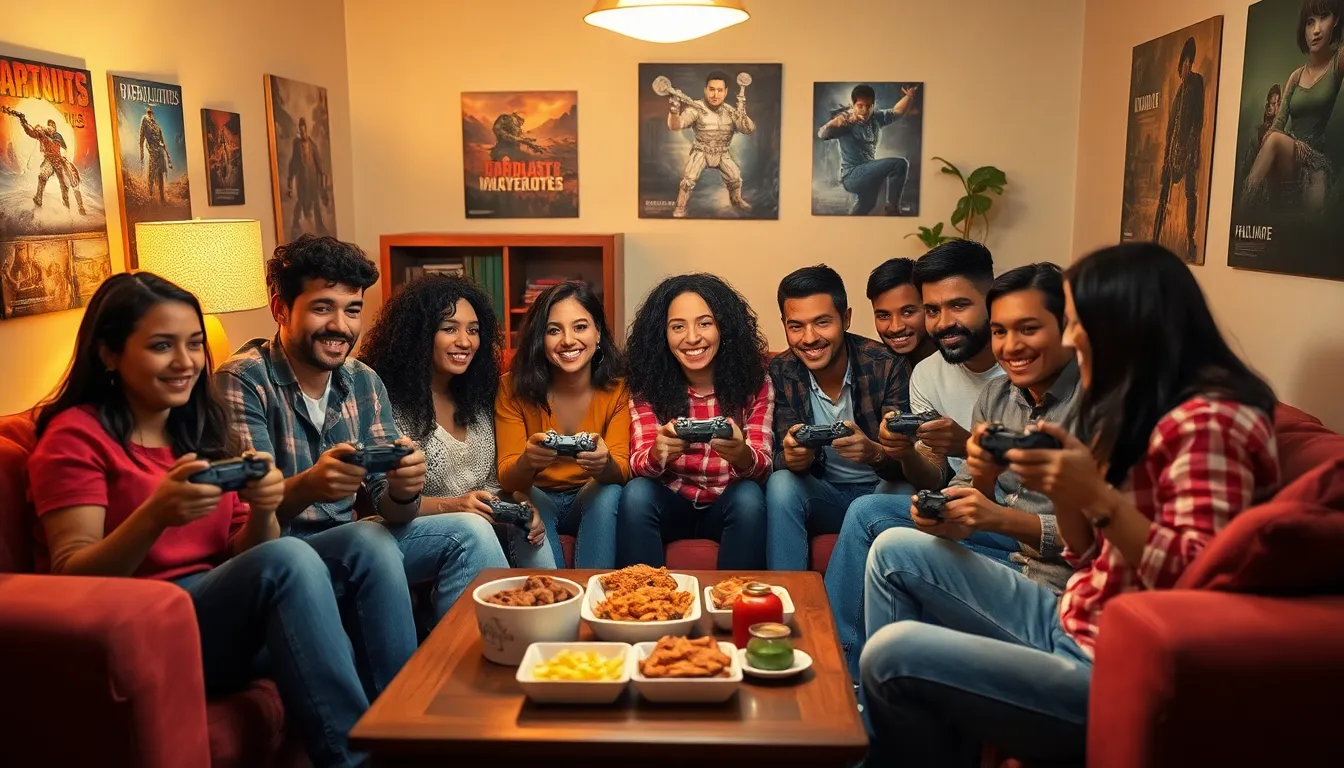In a world where adulting often feels like a never-ending treadmill of responsibilities, video gaming offers a much-needed escape. But how much is too much? As they dive into virtual realms, many adults find themselves wondering if they’re crossing the fine line between casual gamer and full-on joystick warrior.
With epic quests and captivating storylines, it’s easy to lose track of time. Yet, balancing gaming with real-life duties is crucial. After all, no one wants their boss to discover they’ve been slaying dragons instead of meeting deadlines. So, how do adults navigate the pixelated waters of gaming without sinking into chaos? Let’s explore the fine art of gaming moderation and discover just how many hours of gameplay can fit into a balanced adult life.
How Much Overdertoza Video Gaming for Adults
Overdertoza video gaming captures adult attention due to its escape from daily stressors. Adults often find themselves immersed in expansive worlds and stories, leading to extended gaming sessions. Gaming’s engaging mechanics and social interactions play vital roles in its appeal.
Many studies indicate that excessive gaming can lead to negative outcomes. These may include decreased productivity, disrupted sleep patterns, and strained relationships. Maintaining a balanced approach becomes crucial for adults who enjoy video gaming.
Gamers should consider guidelines to manage their time effectively. Setting limits on daily gaming hours helps mitigate potential adverse effects. Incorporating breaks during long gaming sessions fosters focus and reduces fatigue.
Moreover, balancing gaming with other activities enhances overall well-being. Engaging in hobbies, physical exercise, or spending time with family provides necessary breaks from gaming. Adults often benefit from creating a weekly schedule to allocate specific times for gaming. These structured approaches encourage moderation and improve quality of life.
Tracking gaming time offers another strategy for adults. Utilizing apps to monitor playtime allows gamers to remain aware of their habits. Establishing personal rules can help maintain a healthy gaming lifestyle.
Engaging with friends in multiplayer settings also has positive outcomes. Social gaming can promote teamwork and collaboration while maintaining connections with peers. Overdertoza gaming features can create supportive communities that enhance social interaction among players.
Adults maximizing their enjoyment of video games while preventing negative effects creates a sustainable gaming experience.
The Impact of Video Gaming on Adults

Video gaming influences adults in various ways, offering both benefits and potential drawbacks.
Mental Health Benefits
Gaming can positively impact mental well-being. It often serves as an effective stress relief tool, providing an opportunity to unwind. Engaging in video games encourages cognitive skills development, including problem-solving and strategic thinking. Additionally, multiplayer games foster social interactions, reducing feelings of loneliness. According to a study published in the American Journal of Psychiatry, moderate gaming can enhance mood and decrease anxiety levels. Participants reported feeling a sense of accomplishment and improved self-esteem through game achievements. Adult gamers experience these advantages when they integrate gaming into a balanced lifestyle.
Potential Drawbacks
Excessive video gaming poses risks to overall well-being. Productivity may decline as gaming consumes valuable time, leading to procrastination of responsibilities. Relationships often suffer due to neglecting personal connections in favor of gaming hours. Disrupted sleep patterns result from late-night sessions, affecting health and daily functioning. Research indicates that more than 30 hours of gaming per week can contribute to these issues. Adults encountering these negative effects should consider reassessing their gaming habits. Regularly evaluating time spent on games helps maintain a healthy balance between leisure and daily obligations.
Recommended Time Limits
Establishing appropriate time limits for gaming is crucial. Maintaining a balance between gaming and other responsibilities is essential.
Guidelines for Healthy Gaming
Recommendations suggest capping gaming time at 10 to 20 hours per week for adults. Sticking to these limits can prevent interference with work and personal relationships. Scheduling breaks during long sessions offers a chance to recharge and refocus. Engaging in physical activities or hobbies outside of gaming enhances overall well-being and reduces prolonged screen time. Setting specific gaming days allows for better allocation of time, ensuring that other responsibilities remain a priority.
Individual Differences in Gaming Habits
Individual preferences significantly influence gaming habits. Some adults may find enjoyment in daily gaming sessions, while others might only play on weekends. Personal commitments, such as family, work, and social activities, dictate the amount of time available for gaming. Recognizing these differences is critical in tailoring a personal gaming strategy. Evaluating one’s lifestyle helps in determining appropriate gaming limits that foster enjoyment without negative consequences. Frequent self-reflection ensures gaming remains a recreational activity that complements daily life.
Balancing Gaming with Other Activities
Maintaining a healthy balance between video gaming and other responsibilities is essential for adults. It’s vital to recognize that gaming shouldn’t overshadow important life aspects like work, relationships, and self-care. Setting clear gaming limits fosters a sustainable approach to leisure. Allocating 10 to 20 hours per week for gaming helps prevent it from interfering with daily obligations and promotes a healthier lifestyle.
Creating a weekly schedule proves effective in managing gaming time. Allocating specific days and hours for gaming ensures that it complements rather than dominates an individual’s routine. Incorporating breaks during lengthy gaming sessions contributes significantly to maintaining focus and preventing fatigue.
Engaging in physical activities or diverse hobbies counteracts the sedentary nature of gaming. Pursuing interests outside of gaming not only enhances overall well-being but also enriches personal life. Involvement in social events, outdoor exercises, or creative projects can provide a balanced lifestyle.
Monitoring gaming habits allows individuals to reflect effectively. Tracking time spent on gaming through apps highlights usage patterns that may require adjustment. Recognizing when gaming becomes excessive is crucial for maintaining healthy relationships and fulfilling responsibilities.
Exploring multiplayer environments can provide social connections that enhance the gaming experience. Social interactions through gaming can mitigate feelings of loneliness and encourage teamwork. Combining gaming with other social activities fosters an enriching experience that benefits adults.
Video Gaming
Finding the right balance in video gaming is essential for adults. By setting limits and engaging in other activities, individuals can enjoy gaming without letting it disrupt their lives. Moderation plays a key role in ensuring that gaming remains a source of enjoyment and relaxation rather than a source of stress or neglect.
Establishing a structured gaming schedule can help maintain this balance. It allows for both gaming and fulfilling personal responsibilities. By being mindful of gaming habits and prioritizing social interactions, adults can create a fulfilling gaming experience that enhances their overall well-being. Ultimately, the goal is to enjoy gaming while nurturing other important aspects of life.

